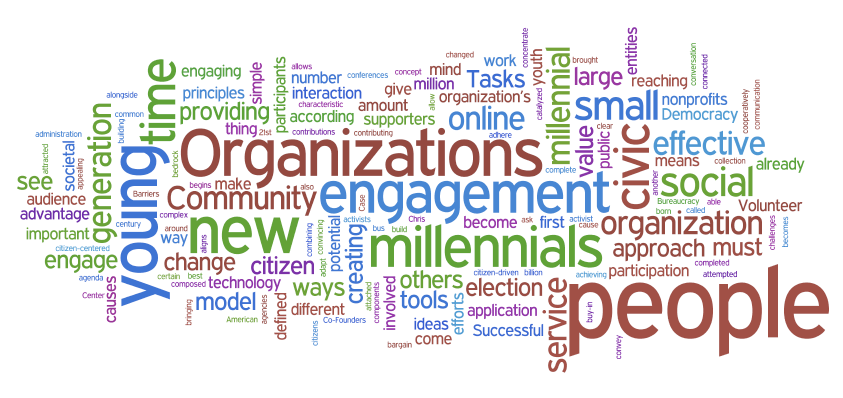Whatever you may think of Millennials, they are natural born savers.
A new report from the Transamerica Center for Retirement Studies shows that since many of these workers entered the workforce at about the same time as the Great Recession, they've been more proactive in saving for perilous employment times.
The study, now in its 15th year, is one of the largest and longest-running surveys of its kind.
“Many Millennials began entering the workforce coincident with the Great Recession. It might be easy to conclude that their prospects for achieving a financially secure retirement are iffy at best,” said Catherine Collinson, president of TCRS. “Much to our surprise and delight, our research found employed Millennials to be an emerging generation of retirement super savers.”
Fueled by Future Uncertainties of Social Security and Aging Parents
“Millennial workers are focused on retirement in a big way. Our research found that three out of four are already discussing saving, investing, and planning for retirement with family and friends,” said Collinson. “In fact, Millennials are twice as likely to frequently discuss retirement compared to their parents’ generation.” The survey found that 18 percent of Millennial workers “frequently” discuss the topic compared to just nine percent of their Baby Boomer counterparts.
Many Millennial workers (41 percent) expect that they will need to financially support their aging parents (29 percent) and/or other family members (20 percent) when they are retired. “Millennials are witnessing firsthand their parents’ retirement perils and are worried that they may need to someday financially support them,” said Collinson.
Moreover, the vast majority of Millennial workers (81 percent) are concerned that Social Security will not be there for them when they are ready to retire. “Millennials are naturally concerned about the future of their Social Security benefits given current forecasts,” said Collinson. “The first Millennials will start turning 67 more than three decades from now in 2046.”
Millennials’ Early and Strong Start in Saving for Retirement
Despite the confidence-shattering events of the Great Recession, Millennial workers’ household retirement savings dramatically increased from $9,000 in 2007 to $32,000 in 2014 (estimated medians), an increase which may be attributable to the timing of Millennials’ entry into the workforce, access to employer benefits, strong savings rates, and dollar-cost averaging of 401(k) contributions throughout the stock market’s decline and subsequent recovery.
“Millennial workers who first started saving for retirement at the bottom of the equity market in 2009 have likely enjoyed substantial gains in their account values as the market recovered,” said Collinson. “Unlike older generations, Millennials were less likely to have suffered steep declines in their accounts during the recession simply because they had not been working and saving long enough to have accumulated large balances.”
Millennial workers are getting a tremendous head start on retirement savings: 70 percent are already saving for retirement either through employer-sponsored plans, such as 401(k)s or similar plans, or outside the workplace, and they began saving at an unprecedented age of 22 (median).
Among those participating in an employer-based 401(k) or similar plan, Millennials are contributing eight percent (median) of their annual salary into their plans. Even more impressive, the annual salary deferral rate for Millennials whose employers offer a matching contribution is 10 percent (median) compared to only five percent (median) of those not offered a match.
“Millennials are taking advantage of innovations to 401(k) plans that have been introduced over the years, including professionally managed accounts and target date funds,” said Collinson. The majority of Millennials who are plan participants (62 percent) are using some form of professionally managed investment feature such as a managed account service, strategic allocation fund, and/or target date fund.
Millennials Still Need a Solid Strategy for Long-Term Retirement Success
“One of the most important secrets to attaining retirement readiness is having a well-defined written strategy about retirement income needs, costs, expenses and risk factors,” said Collinson. While the majority of Millennial workers (59 percent) say they have a retirement strategy, only 13 percent have a written plan (the other 46 percent have a plan but it is not written down). Among those who have estimated their retirement savings needs, 52 percent said they had “guessed” and only 10 percent have used a retirement calculator or worksheet.
“Over the course of Millennials’ working lives, the retirement landscape will inevitably change,” said Collinson. “It’s important to begin planning for retirement now and periodically update those plans over the coming decades.”
Three strategic steps for achieving retirement readiness and long-term retirement success include:
- Save for retirement. Start saving as early as possible – and as much as possible to maximize potential compounding of investments. Save consistently over time. Avoid taking loans and early withdrawals from retirement accounts as they can severely inhibit the growth of long-term retirement savings.
- Calculate retirement savings needs, develop a retirement strategy, and write it down. In creating a plan, consider lifestyle, living expenses, healthcare needs, government benefits, and other factors, as well as a backup plan in case retirement comes early due to an unforeseen circumstance.
- Get educated about retirement investing. Whether relying on the expertise of professional advisors or taking a more do-it-yourself approach, gain the knowledge to ask questions and make informed decisions. Seek assistance from a professional financial advisor, if needed.
“A good job is also a strategically important ingredient for personal retirement security. It’s virtually impossible to save consistently over time without a steady income,” said Collinson. “Stay competitive in today’s job market by excelling at your current job, keeping your skills up-to-date, and staying current with employers’ needs.”
Thanks for reading CPA Practice Advisor!
Subscribe Already registered? Log In
Need more information? Read the FAQs
Tags: Benefits, Financial Planning, Staffing




